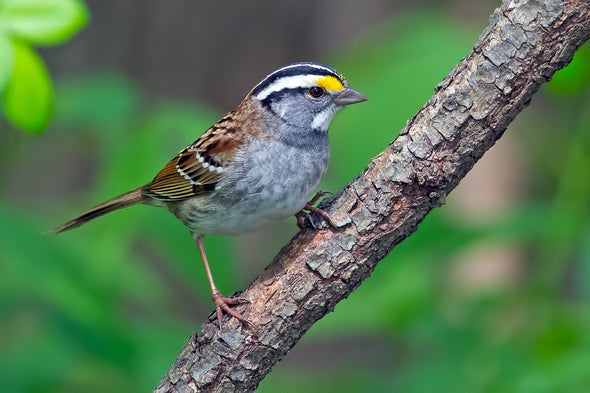(单词翻译:单击)
听力文本
This is Scientific American's 60-second Science, I'm Susanne Bard.
Like many birds, male white-throated sparrows belt out songs to defend their territories and attract mates. And until the year 2000, one particular song stood out as the most popular white-throat tune in forests across Canada.
(CLIP: Triplet song)
"The end part of the song is a three-syllable repeat. That's supposed to sound like 'Oh my sweet Canada, Canada, Canada.'"
University of Northern British Columbia behavioral ecologist Ken Otter.
"And if you look in most books that describe what the song sounds like, it always has a three-syllable phrase at the end of it."
But when Otter moved to Prince George, a wooded city in western Canada, 20 years ago, he noticed that its sparrows were singing a different tune.
"The males have dropped one of the notes, so instead of having three syllables repeating, it's actually two syllables repeating."
(CLIP: Doublet song)
"'Oh my sweet Cana, Cana, Canada.'"

Back in the 1950s, though, the Prince George population was still singing the standard triplet song.
"So sometime during that 50-year period, the song had transitioned to this new dialect, and all the males had adopted it."
Over the next few years, Otter's team discovered that the doublet song variant was spreading eastward.
"And it's replacing the old song as it goes."
By 2010 the song had invaded Ontario, thousands of kilometers from Prince George. Once it became popular, it began to spread even faster.
"And right now it has moved all the way across Eastern Ontario and is kind of bordering Quebec."
Otter was surprised by the rapid, widespread adoption of the doublet song, because most new bird song dialects don't travel far.
"It's very much at odds with a lot of the traditional ideas that we have about how dialects form and how they persist over time."
The doublet song likely owes its spread to the birds' migration habits. Tracking sparrows from western Canada revealed that they intermingle with eastern birds on their wintering grounds in the southern Great Plains. Those eastern birds probably learn the new dialect there and then bring it back home.
The study is in the journal Current Biology.
It's not yet known what advantages singing the doublet song offers. So far, there's no evidence that the males react differently to the two variants when defending their territories. But the researchers also plan to test whether the new dialect's popularity is driven by a female preference for novelty. One thing's for sure: we aren't the only species that can make a tweet go viral.
Thanks for listening for Scientific American's 60-second Science. I'm Susanne Bard.
参考译文
这里是科学美国人——60秒科学系列,我是苏珊娜·巴德。
和许多鸟类一样,雄性白喉带鹀用歌声来保卫自己的领地并吸引配偶。直到2000年,一首特别的歌脱颖而出,成为加拿大森林中白喉带鹀最流行的曲调。
(音频片段:三音节重复歌曲)
“这首歌的结尾部分是三个音节的重复。听起来像是‘哦,我亲爱的加拿大,加拿大,加拿大。’”
北不列颠哥伦比亚大学的行为生态学家肯·奥特说到。
“如果你查阅描述这首歌的书籍,大多数都会说其结尾总有三音节的短语。”
但20年前,在奥特尔到加拿大西部树木繁茂的城市乔治王子城时,他注意到那里的鸟儿唱着不同的曲调。
“雄鸟漏掉了其中一个音符,因此歌曲结尾不是三个音节重复,而是两个音节重复。”
(音频片段:两音节重复歌曲)
“‘哦,我亲爱的加拿大,加拿大,加拿大。’”
不过,上世纪50年代时,乔治王子城的鸟群仍在唱标准的三音节重复歌曲。
“因此,在那50年中的某个时间,歌曲转变成这种新方言,所有的雄鸟都接受了这种方言。”
之后几年,奥特的团队发现两音节重复歌曲的变体逐步向东传播。
“它在传播过程中取代了老歌。”
到2010年,这首歌已侵入距离乔治五子城数千公里的安大略省。一旦流行起来,这首歌就开始以更快速度传播。
“现在,这首歌一路穿越安大略省东部,几乎就要传播到与魁北克省的边界了。”
奥特对两音节重复歌曲被接受的速度之快和传播之广感到惊讶,因为大多数鸟类的新歌声方言不会传播很远。
“这与我们关于方言如何形成以及如何随着时间的推移而持续等许多传统观念差异很大。”
这首双音节歌曲的传播很可能要归功于鸟类的迁徙习性。追踪加拿大西部白喉带鹀的项目发现,它们在大平原南部越冬地时,与东部鸟类待在一起。那些东部鸟儿可能在那里学会了新方言,之后把其带回了家。
这项研究发表在《当代生物学》期刊上。
现在尚不清楚唱双音节歌曲有何好处。到目前为止,还没有证据表明雄鸟在保卫自己的领地时对这两种歌声变体做出不同反应。但研究人员也计划进行测试,看看这种新方言的流行是否是由雌鸟对新奇事物的偏好所驱动。有一点是肯定的:我们不是唯一可以让叫声(推特)走红的物种。
谢谢大家收听科学美国人——60秒科学。我是苏珊娜·巴德。
译文为可可英语翻译,未经授权请勿转载!
重点讲解
重点讲解:
1. belt out 大声唱;大声演奏;
He held a three-hour family Karaoke session in his hotel, belting out Sinatra and Beatles hits.
他在他的酒店举行了一场历时3个钟头的家庭卡拉OK演唱会,其间高歌了辛纳屈和甲壳虫乐队的一些热门歌曲。
2. stand out 突出;出色;
If you are different, you will stand out.
如果你与众不同,你将脱颖而出。
3. at odds with (与…)不和;(与…)有矛盾;(与…)意见不一致;
These findings are at odds with what is going on in the rest of the country.
这些研究结果与国内其他地区的实际情况并不相符。
4. owe to 应把…归因(于);应把…归功(于);
He owes his success to hard work.
他的成功是靠勤奋工作。


